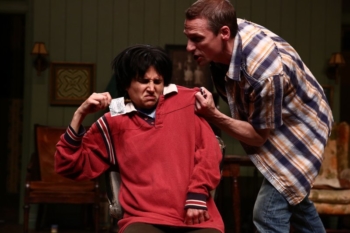
The Sound and the Fury • Press
- The New York Times May 21, 2015
- TimeOut New York January 20, 2015
- Theatermania May 21, 2015
- Exeunt Magazine May 21, 2015
- New York Post May 21, 2015
- New York Daily News May 22, 2015
- Theater Pizzazz! May 21, 2015
- Huffington Post May 21, 2015
- The Bergen Record May 22, 2015
- The Advertiser March 12, 2010
- The Australian March 15, 2010
- Expresso-Actual January 24, 2009
- Publico January 20, 2009
- The New Yorker May 26, 2008
- The New Yorker May 5, 2008
- The New York Times April 30, 2008
- Time Out New York April 30-May 6, 2008
- Time Out New York April 30, 2008
- The New York Sun April 30, 2008
- The International Herald Tribune April 29, 2008
- Backstage April 29, 2008
- Variety April 29, 2008
- The New York Times April 27, 2008
- Variety November 30, 2007
- The Brooklyn Rail April 2008
- The Village Voice March 4, 2008
- Variety November 30, 2007
Elevator Repair Service’s The Sound and the Fury: EW stage review
By Isabella Biedenharn
When literature is adapted from the page to the stage, there are a few paths the new work can take. In one, as with Roald Dahl’s Matilda, the literary aspect—first-person thoughts, a writer’s lovely turn of phrase—might be watered down to focus on the magic of the story; in another, the performance can decide not to untangle a story’s complicated narrative vines, but instead to illuminate its overall complexity. In The Sound and The Fury—returning to NYC’s Public Theater after a successful run in 2008—Elevator Repair Service (best known for their day-long, full-text production of Gatz) splits both of those paths, keeping William Faulkner’s language and the feel of the story intact.
Extracting the notoriously difficult first chapter, “April Seventh, 1928,” of Faulkner’s masterpiece as the script—a meandering, stream-of-conscious section narrated by the mentally disabled Benjy Compson, which jumps frenetically backward and forward in time—the actors play a sort of musical chairs with their roles. In one moment, for instance, actress Lucy Taylor might be playing “Mother,” but in the next scene, to illustrate a shift in time, Vin Knight suddenly inhabits the same character. Occasionally, the audience can see this shift by a costume change, but more often than not, you must listen for it. Lines of dialogue include their attribution—i.e. “‘What is it now?’ Mother said”; “‘He wants to go out doors.’ Versh said.”
Confusing at first, and a bit exhausting, this strange role-swapping not only showcases ERS’s nimble acting chops, but also blurs racial and gender lines in a fascinating way. It’s jarring when the white, male actor playing “Father” suddenly turns into Dilsey, the maternal black housekeeper—but why shouldn’t a white man step into a black woman’s shoes? And similarly, why shouldn’t Daphne Gaines, who originally plays Dilsey, take a turn as Jason Compson? It requires audience members to use their imaginations as much as their internal logic, and the lack of control the audience feels must mirror Benjy’s feelings, where everyone talks around him, talks down to him, talks about him as if he can’t hear them.
Between this visual dissonance and soundtrack of wailing and radio static, we get some sense of the blurry turmoil of living as Benjy. The Sound and the Fury is the sort of work that’s tough to take in initially, but that stays with you long after, like a slow drip of oil onto the gears of your mind to ensure they’ll keep spinning. A–
Excerpt from “Elevator Repair Service’s The Sound and the Fury: EW stage review” by Isabella Biedenharn. Read the full article here.